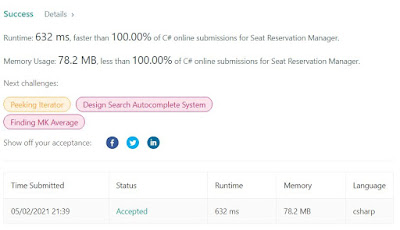Seat Manager == Priority Queue
This problem just requires a direct implementation of a Priority Queue, take a look: Seat Reservation Manager - LeetCode
1845. Seat Reservation Manager
Medium
Design a system that manages the reservation state of n seats that are numbered from 1 to n.
Implement the SeatManager class:
SeatManager(int n)Initializes aSeatManagerobject that will managenseats numbered from1ton. All seats are initially available.int reserve()Fetches the smallest-numbered unreserved seat, reserves it, and returns its number.void unreserve(int seatNumber)Unreserves the seat with the givenseatNumber.
Example 1:
Input ["SeatManager", "reserve", "reserve", "unreserve", "reserve", "reserve", "reserve", "reserve", "unreserve"] [[5], [], [], [2], [], [], [], [], [5]] Output [null, 1, 2, null, 2, 3, 4, 5, null] Explanation SeatManager seatManager = new SeatManager(5); // Initializes a SeatManager with 5 seats. seatManager.reserve(); // All seats are available, so return the lowest numbered seat, which is 1. seatManager.reserve(); // The available seats are [2,3,4,5], so return the lowest of them, which is 2. seatManager.unreserve(2); // Unreserve seat 2, so now the available seats are [2,3,4,5]. seatManager.reserve(); // The available seats are [2,3,4,5], so return the lowest of them, which is 2. seatManager.reserve(); // The available seats are [3,4,5], so return the lowest of them, which is 3. seatManager.reserve(); // The available seats are [4,5], so return the lowest of them, which is 4. seatManager.reserve(); // The only available seat is seat 5, so return 5. seatManager.unreserve(5); // Unreserve seat 5, so now the available seats are [5].
Constraints:
1 <= n <= 1051 <= seatNumber <= n- For each call to
reserve, it is guaranteed that there will be at least one unreserved seat. - For each call to
unreserve, it is guaranteed thatseatNumberwill be reserved. - At most
105calls in total will be made toreserveandunreserve.
Accepted
5,450
Submissions
10,477
It is a direct implementation of Priority Queue. Code is down below, cheers, ACC.
public class SeatManager
{
private PriorityQueue pQueue = null;
public SeatManager(int n)
{
pQueue = new PriorityQueue(true);
for (int i = 1; i <= n; i++)
{
pQueue.Enqueue(i, i);
}
}
public int Reserve()
{
return (int)pQueue.Dequeue();
}
public void Unreserve(int seatNumber)
{
pQueue.Enqueue(seatNumber, seatNumber);
}
}
public class PriorityQueue
{
public struct HeapEntry
{
private object item;
private double priority;
public HeapEntry(object item, double priority)
{
this.item = item;
this.priority = priority;
}
public object Item
{
get
{
return item;
}
}
public double Priority
{
get
{
return priority;
}
}
}
private bool ascend;
private int count;
private int capacity;
private HeapEntry[] heap;
public int Count
{
get
{
return this.count;
}
}
public PriorityQueue(bool ascend)
{
capacity = 1000000;
heap = new HeapEntry[capacity];
this.ascend = ascend;
}
public object Dequeue(/*out double priority*/)
{
//priority = heap[0].Priority;
object result = heap[0].Item;
count--;
trickleDown(0, heap[count]);
return result;
}
public object Peak(/*out double priority*/)
{
//priority = heap[0].Priority;
object result = heap[0].Item;
return result;
}
public void Enqueue(object item, double priority)
{
count++;
bubbleUp(count - 1, new HeapEntry(item, priority));
}
private void bubbleUp(int index, HeapEntry he)
{
int parent = (index - 1) / 2;
// note: (index > 0) means there is a parent
if (this.ascend)
{
while ((index > 0) && (heap[parent].Priority > he.Priority))
{
heap[index] = heap[parent];
index = parent;
parent = (index - 1) / 2;
}
heap[index] = he;
}
else
{
while ((index > 0) && (heap[parent].Priority < he.Priority))
{
heap[index] = heap[parent];
index = parent;
parent = (index - 1) / 2;
}
heap[index] = he;
}
}
private void trickleDown(int index, HeapEntry he)
{
int child = (index * 2) + 1;
while (child < count)
{
if (this.ascend)
{
if (((child + 1) < count) &&
(heap[child].Priority > heap[child + 1].Priority))
{
child++;
}
}
else
{
if (((child + 1) < count) &&
(heap[child].Priority < heap[child + 1].Priority))
{
child++;
}
}
heap[index] = heap[child];
index = child;
child = (index * 2) + 1;
}
bubbleUp(index, he);
}
}




Comments
Post a Comment